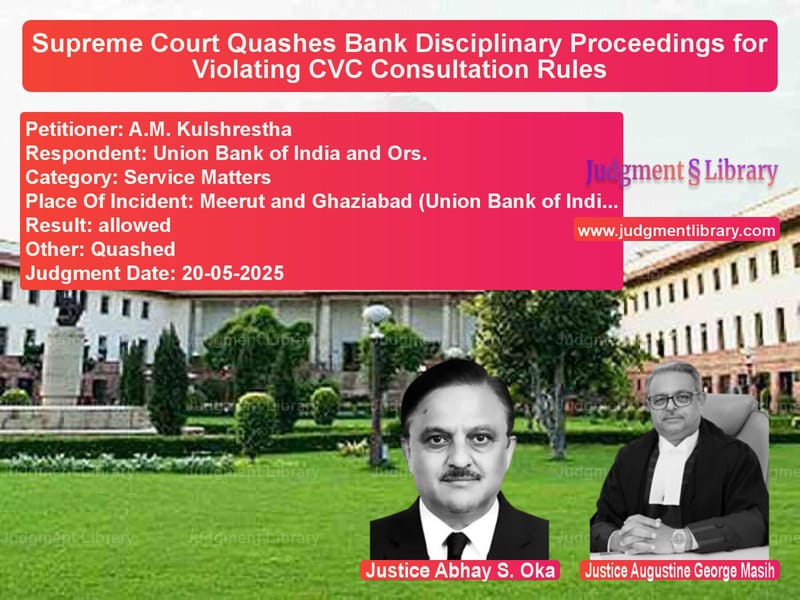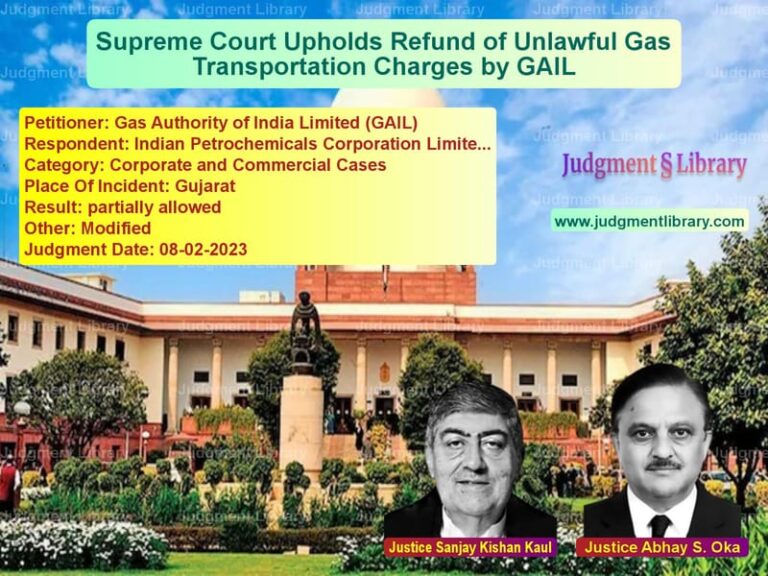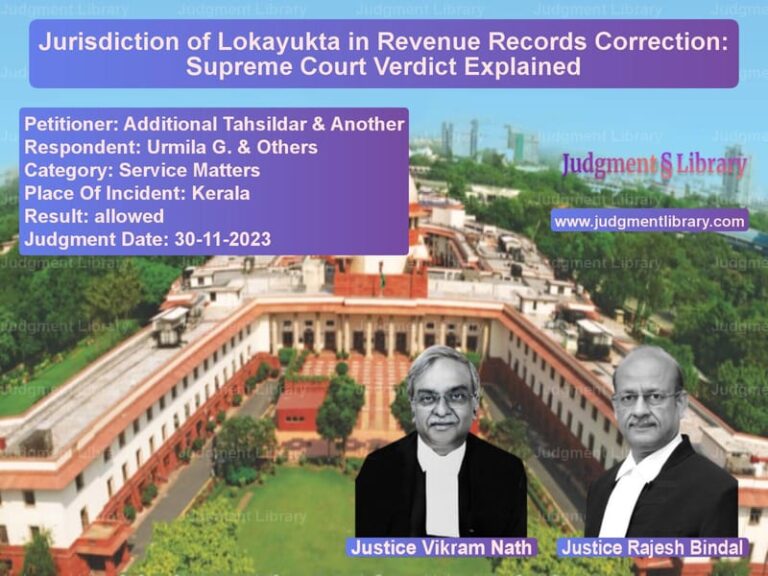Supreme Court Quashes Bank Disciplinary Proceedings for Violating CVC Consultation Rules
In a significant judgment that underscores the importance of procedural fairness in disciplinary matters, the Supreme Court of India has quashed disciplinary proceedings initiated by Union Bank of India against one of its senior employees who had served the bank for 34 years with an unblemished record. The Court found that the bank acted in a mala fide and arbitrary manner by issuing a charge sheet without waiting for the mandatory first-stage advice from the Central Vigilance Commission (CVC), despite having acknowledged that such consultation was necessary in the case.
The case involved A.M. Kulshrestha, who had served Union Bank of India from 1984 until his scheduled superannuation on June 30, 2019. After 34 years of service and having been promoted to Deputy General Manager in 2016, Kulshrestha was suspended in August 2018, just ten months before his retirement. The allegations against him related to his role as Regional Head in Meerut, where he was accused of adopting a “casual approach” while sanctioning credit proposals for 16 accounts from the Mid-corporate Ghaziabad branch.
The Legal Battle Unfolds
The appellant, through his learned senior counsel, mounted a formidable challenge to the disciplinary proceedings, primarily focusing on the bank’s failure to comply with Regulation 19 of the Union Bank of India Officer Employees’ (Discipline & Appeal) Regulations, 1976. The regulation states: “The Bank shall consult the Central Vigilance Commission wherever necessary, in respect of all disciplinary cases having a vigilance angle.”
The appellant’s counsel argued that this provision imposed a mandatory requirement on the bank to seek CVC’s advice in all complaints involving allegations of corruption before issuing a charge sheet to an employee. To support this contention, the counsel referred to several CVC circulars that clearly outlined the consultation process. Circular No. 99/VGL/66 dated September 28, 2000, stated: “The Commission, at present, is being consulted at two stages in disciplinary proceedings, i.e. first stage advice is obtained on the investigation report before issue of the charge sheet, and second stage advice is obtained either on receipt of reply to the charge sheet or on receipt of inquiry report.”
Similarly, Circular No. 07/04/15 dated April 27, 2015, provided: “As per the existing scheme for consultation with the Commission, the CVOs of the Ministries / Departments and all other organisations are required to seek the Commission’s first stage advice after obtaining the tentative views of Disciplinary Authorities (DAs) on the reports of the preliminary inquiry / investigation of all complaints involving allegation(s) of corruption or improper motive; or if the alleged facts prima-facie indicate an element of vigilance angle which are registered in the Vigilance Complaint Register involving Category-A officers… before the competent authority takes a final decision in the matter.”
The appellant’s counsel also drew attention to Section 8(1)(h) of the Central Vigilance Commission Act, 2003, which empowers the CVC to exercise superintendence over vigilance administration of various government ministries and corporations. Additionally, Clause 7.9.1 of the CVC’s Vigilance Manual, 2017, reinforced the requirement for seeking the Commission’s first-stage advice.
Perhaps the most compelling argument came from the bank’s own affidavits filed before the High Court. The appellant’s counsel pointed to affidavits dated May 23, 2019, and June 13, 2019, filed by the General Manager and Executive Director of the bank respectively, where they explicitly admitted that the proceedings had a vigilance angle and that the case had been referred to CVC for advice under Regulation 19. The Executive Director’s affidavit specifically stated: “That on receipt of the advice of CVC, the respondent bank shall be soon issuing Articles of Charge/Chargesheet to the appellant along with other concerned officials who are found to be involved in the matter.” The appellant’s counsel argued that having made these solemn statements on oath, the bank was now estopped from initiating disciplinary proceedings unilaterally without obtaining CVC’s first-stage advice.
The Bank’s Defense
The respondents, represented by their learned counsel, presented several arguments to justify their actions. They contended that as per Clause 7.9.1 of the CVC Manual, the Commission’s first-stage advice is required to be sought ‘before the competent authority takes a final decision in the matter.’ The bank argued that issuing a charge sheet does not amount to taking a final decision but only initiates disciplinary proceedings. Therefore, the charge sheet could not be vitiated for not taking CVC’s advice.
The bank’s counsel revealed that they had indeed sought CVC’s first-stage advice through a letter dated May 17, 2019, but received the response only on June 21, 2019. They claimed this was done as a matter of “abundant caution.” The counsel argued that rules and regulations should not be interpreted in a manner that stalls or delays the disciplinary process until receipt of advice from CVC. “The disciplinary proceedings against the delinquents cannot be frustrated solely on account of the CVC’s inaction,” they contended.
The bank also denied taking contradictory stands in the two rounds of litigation before the High Court and refuted allegations that the charge sheet was prepared hastily, ante-dated, or served only by email for mala fide reasons. They maintained that no prejudice was caused to the appellant by serving the charge sheet and continuing disciplinary proceedings against him.
The Supreme Court’s Analysis
The Supreme Court bench comprising Justices Abhay S. Oka and Augustine George Masih conducted a thorough examination of the factual matrix and legal provisions. The Court noted several crucial factual aspects: the appellant had a blemishless record for 34 years; he was suspended just ten months before superannuation; the bank had issued show-cause notices in January and March 2019; and in affidavits before the High Court, bank officials had explicitly stated that charge sheets would be issued only after receiving CVC’s advice.
Read also: https://judgmentlibrary.com/pension-rights-for-absorbed-employees-supreme-court-landmark-ruling/
The Court made a significant observation about the nature of Regulation 19: “Regulation 19 of the 1976 Regulations stipulates that the Bank shall consult the CVC, wherever necessary, in respect of disciplinary cases having a vigilance angle. A reading of the regulation makes it clear that in cases where the Respondent Bank deems that the consultation is necessary due to the case having a vigilance angle, the Respondent Bank is required to seek the advice of the CVC.”
The Court found that in this particular case, it wasn’t necessary to determine whether Regulation 19 was mandatory or directory because “the Respondent Bank has itself acknowledged that the case had a vigilance angle and consultation with the CVC is necessary, and therefore, the Respondent Bank had sought the opinion of the CVC.”
The Court examined the CVC circulars and noted: “As can be seen from the Circulars, the CVC is being consulted at two stages for its advice. The first stage advice is sought before the issuance of the charge sheet, and the second stage advice is either on receipt of the reply to the charge sheet or on receipt of the enquiry report.”
The Court highlighted the contradiction in the bank’s actions: “As can be seen from the affidavit dated 23rd May 2019, filed by the General Manager of the Bank, the first stage advice of the CVC has been sought. The affidavit dated 13th June 2019 filed by the Executive Director also clearly states that on the receipt of the advice of the CVC, the Bank shall issue a charge sheet to the appellant. As stated earlier, within five days of filing the said affidavit, the charge sheet dated 10th June 2019 was served upon the appellant. This was done without receiving the first stage advice from the CVC.”
The Court noted that the bank had sought CVC’s advice only on May 17, 2019—nine months after the suspension order—despite having issued show-cause notices in January and March 2019. The Court observed: “Thus, the respondent-Bank accepted that Regulation 19 of the 1976 Regulations was applicable and therefore, first-stage advice of the CVC was sought. Even before getting the first stage advice, on 10th June 2019, the charge sheet was kept ready which was served upon the appellant on 18th June 2019. In this case, the Respondent Bank itself accepted the necessity of seeking first-stage advice from the CVC. Therefore, it was not open for the Bank to serve the charge sheet without receiving and considering the first stage advice by the CVC.”
The Court’s Strong Observations
The Supreme Court made several strong observations about the bank’s conduct, particularly noting the timing of the actions against an employee with 34 years of unblemished service. The Court stated: “As stated earlier, only ten months before the date of superannuation, an order of suspension was served upon the appellant. This was done after 34 years of unblemished service. Although it was necessary to take the first stage advice of the CVC, the advice was sought only as late as on 17th May 2019. Twelve days before reaching the age of superannuation, a charge sheet was served upon the appellant, without receiving and considering the CVC’s advice. This was despite the specific statement made by the Executive Director in the earlier petition on oath, which stated that the charge sheet would only be served upon receipt of advice from the CVC.”
The Court delivered its decisive conclusion on the bank’s conduct: “Once, the first stage advice of the CVC was called, it was the duty of the respondent-Bank to consider the advice and then take a decision to serve the chargesheet. Thus, the actions of the respondent-Bank are mala fide and arbitrary. The appellant was sought to be victimised at the fag end of his unblemished career of 34 years.”
The Court also criticized the High Court’s approach: “The High Court committed a gross error by holding that Regulation 19 of the 1976 Regulations was not mandatory. This issue was irrelevant, as the Bank had itself acknowledged that in the facts of the case, it was necessary to seek first-stage advice from the CVC.”
Considering the passage of time—almost six years since the appellant’s superannuation—the Court found it would be unjust to allow the bank to resume disciplinary proceedings. While allowing the appeal and quashing the disciplinary proceedings, the Court made an important distinction regarding financial benefits: “Though the appellant will be entitled to all retiral benefits, he shall not be entitled to any back wages.”
The Final Judgment
In its conclusive ruling, the Supreme Court stated: “Accordingly, the disciplinary proceedings, including the charge sheet dated 10th June 2019, are hereby quashed and set aside. Although the appellant shall not be entitled to back wages and allowances, the Respondent Bank shall release all retirement benefits admissible on the basis that the appellant has superannuated as of 30th June 2019. The amount of retirement benefits due to the appellant in accordance with the law, shall be paid to the appellant within three months from today.”
This judgment serves as a significant precedent emphasizing that when an institution acknowledges the necessity of following specific procedures—especially those designed to ensure fairness in disciplinary matters—it must adhere to them consistently. The Supreme Court’s ruling protects employees from arbitrary actions, particularly at the fag end of their careers, and reinforces the principle that procedural compliance is not merely a technicality but a fundamental aspect of justice.
The case also highlights the importance of the Central Vigilance Commission’s role in maintaining integrity in public sector institutions and ensures that disciplinary authorities cannot bypass established vigilance procedures for expediency or other considerations. For countless employees in public sector banks and government institutions, this judgment stands as a safeguard against potential victimization and arbitrary disciplinary actions.
Petitioner Name: A.M. Kulshrestha.Respondent Name: Union Bank of India and Ors..Judgment By: Justice Abhay S. Oka, Justice Augustine George Masih.Place Of Incident: Meerut and Ghaziabad (Union Bank of India).Judgment Date: 20-05-2025.Result: allowed.
Don’t miss out on the full details! Download the complete judgment in PDF format below and gain valuable insights instantly!
Download Judgment: a.m.-kulshrestha-vs-union-bank-of-india-supreme-court-of-india-judgment-dated-20-05-2025.pdf
Directly Download Judgment: Directly download this Judgment
See all petitions in Disciplinary Proceedings
See all petitions in Employment Disputes
See all petitions in Pension and Gratuity
See all petitions in Public Sector Employees
See all petitions in Termination Cases
See all petitions in Judgment by Abhay S. Oka
See all petitions in Judgment by Augustine George Masih
See all petitions in allowed
See all petitions in Quashed
See all petitions in supreme court of India judgments May 2025
See all petitions in 2025 judgments
See all posts in Service Matters Category
See all allowed petitions in Service Matters Category
See all Dismissed petitions in Service Matters Category
See all partially allowed petitions in Service Matters Category







